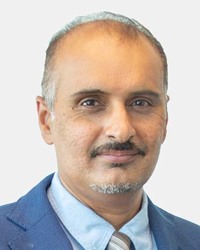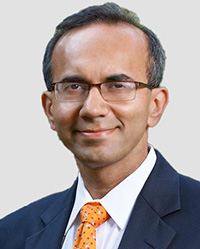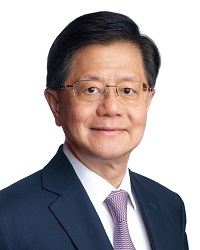Industry Outreach Series
ABFER-ISAS-EAI Seminar
Tech for All Lab by Prof Tarun Khanna
The benefits of new digital and data-driven technologies are undeniable. The most valuable companies in the world increasingly rely on data, networks, and algorithms to create value for their users and customers. Furthermore, digital technologies and digitization transform basic and applied research in numerous disciplines. Yet, the benefit of this innovation is very unevenly distributed. Technology is still primarily built in developed economies for customers, firms, researchers, and policymakers in developed economies. Many parts of the world, e.g., Africa and ASEAN, could explore and benefit from the opportunities the technology creates. Even within countries like the United States, there remain stark inequities. Innovation and entrepreneurship not only fail to include women and minorities as builders, but also fail to build for women, minorities, persons with disabilities, and users outside of major tech hubs like Silicon Valley, Boston, and New York City.
Prof Khanna will discuss an initiative by Harvard Business School’s Digital, Data, and Design Institute called “Tech for All.” The initiative aims to broaden the benefits of digital innovation and entrepreneurship to include more people in developing economies, women, people of color, and those in economically disadvantaged circumstances or regions. The initiative has a dual mission: both advancing research on this topic and enabling the commercialization, translation, and scaling of digital technologies that can significantly benefit the underserved. Collaborators in this initiative will generate data-driven evidence, disseminated through academic papers and practitioner-focused articles, regarding the underserved constituencies. They will equally focus on identifying the frictions that drive such inequities and exploring how firms can use design, data, and new digital technologies to better invent for everyone.
Registration
Please register at https://forms.office.com/r/c6srQcpEEz.
2022
Level 6, Block B, 29 Heng Mui Keng Terrace, Singapore 119620
https://mei.nus.edu.sg/about/contact/
Moderator:
Professor Bernard Yeung, Stephen Riady Distinguished Professor in Finance and Strategic Management, NUS Business School, National University of Singapore and President of ABFER
Speakers
-

Associate Professor Iqbal Singh Sevea
Director, Institute of South Asian Studies at the National University of Singapore
Iqbal Singh Sevea is Director, Institute of South Asian Studies at the National University of Singapore (NUS). He is the fifth director of the research institute and is concurrently a Visiting Associate Professor with the Department of History at NUS.
Associate Professor Sevea is an internationally recognised scholar of contemporary and modern South Asia whose core research focuses on South Asian politics, social and political thought, and governance. He has held academic appointments at leading institutions globally and is the author of several publications. Before joining ISAS, he was an Associate Professor with the Department of History at the University of North Carolina-Chapel Hill where he was a faculty member from 2012 to 2021. From 2018 to end 2021, he was also a Visiting Research Associate Professor at ISAS. Prior to this, he was an Assistant Professor and the Coordinator of the Contemporary Islam Programme at the S Rajaratnam School of International Studies (RSIS) at the Nanyang Technological University. He is the current Vice-President of the American Institute of Pakistan Studies and has also served on the committee of the American Institute of Indian Studies.
Associate Professor Sevea is the author of the books, The Political Philosophy of Muhammad Iqbal: Islam and Nationalism in Late Colonial India (New York: Cambridge University Press, 2012) and Islamic Political Thought in Modern South Asia (Cambridge: Cambridge University Press, forthcoming, 2022). His other publications include articles and chapters on ethnonationalism in South Asia, the Partition and its aftermath, culture and state ideology in Pakistan, the spread of transnational Islamic movements across the Indian Ocean, conceptions of bodily piety in South Asia, and Muslim education in South Asia.
Associate Professor Sevea holds a DPhil in History from the University of Oxford. He graduated with a bachelor’s degree in History from NUS and a master’s degree from the School of Oriental and African Studies, University of London. -

Professor Tarun Khanna
Jorge Paulo Lemann Professor, Harvard Business School; Director, Lakshmi Mittal and Family South Asia Institute, Harvard University and Senior Fellow, ABFER
Tarun Khanna is the Jorge Paulo Lemann Professor at the Harvard Business School. For over two decades, he has studied entrepreneurship as a means to social and economic development in emerging markets. At HBS since 1993, after obtaining degrees from Princeton and Harvard, he has taught courses on strategy, corporate governance and international business to MBA and Ph.D. students and senior executives.
A summary of his work on emerging markets appeared in his 2010 co-authored book, Winning in Emerging Markets, and an example of his comparative work on entrepreneurship appears in his 2008 first-person analysis of China and India, Billions of Entrepreneurs, both published by Harvard Business Press and translated into many languages. In 2014, his piece, Contextual Intelligence, was a runner-up for the McKinsey Prize for the year’s best article in the Harvard Business Review. His latest book, Trust: Creating the foundations for Entrepreneurship in Developing Countries, was released in 2018 and articulates why entrepreneurship has both higher reward and risk in emerging markets than in mature economies.
He was named the first director of Harvard’s university-wide Lakshmi Mittal and Family South Asia Institute in the fall of 2010. The institute rapidly grew to engage over 150 faculty from across Harvard in projects embracing the pure sciences, social sciences and the humanities, and spanning the region from Afghanistan to Myanmar. A centerpiece of the Institute’s strategy is a deep local presence, anchored through offices in New Delhi and Lahore. During the past decade, he also oversaw HBS activities across South Asia, anchored in Mumbai.
In this role, he currently teaches a popular university-wide elective course, Contemporary Developing Countries, where students work in multi-disciplinary teams to devise practical solutions to complex social problems. The course is part of Harvard’s undergraduate general education core curriculum, and is rare in that it also attracts graduate students from across the university, engaging ‘sophomores to surgeons.’ A free online version on the edX platform, Entrepreneurship in Emerging Economies, has been taken by over half a million students in 200 countries. In 2007, he was nominated Young Global Leader (under 40) by the World Economic Forum; in 2009, elected as a Fellow of the Academy of International Business; in 2016, recognized by the Academy of Management as Eminent Scholar for Lifetime Achievement in the field of International Management.
Between 2015 and 2019, he was appointed to several national commissions by the Government of India, first to chair the effort to frame policies for entrepreneurship in India. More recently, he has been part of the commission to help select India’s Institutes of Eminence, an attempt to enhance India’s leading Universities for the future, and a new commission to enhance scientific literacy in the country.
Outside HBS, he serves on numerous for-profit and not-for-profit boards in the US and India. In the past decade, this included AES, a Washington DC headquartered global power company, and India-based Bharat Financial Inclusion Limited (BFIL), one of the world’s largest firms dedicated to financial inclusion for the poor. Recently, he joined the board of in Mobi, India’s first ‘unicorn’, a global technology provider of enterprise platforms for marketers. He is a co-founder of several entrepreneurial ventures in the developing world, spanning India, China, Southeast Asia and the Middle East. Recently, he co-founded Axilor, a vibrant incubator in Bangalore. In 2015, he was appointed a Trustee of Boston’s Museum of Fine Arts. He lives in Newton, MA, with his wife, daughter and son. -

Professor Bernard Yeung
Stephen Riady Distinguished Professor in Finance and Strategic Management, NUS Business School, National University of Singapore and President of ABFER
Bernard Yeung is Stephen Riady Distinguished Professor in Finance and Strategic Management at the National University of Singapore Business School. He is also the President of the Asian Bureau of Finance and Economic Research. He was Dean of NUS Business School from June 2008 to May 2019. Before joining NUS, he was the Abraham Krasnoff Professor in Global Business, Economics, and Management at New York University (NYU) Stern School of Business. He has also served as the Director of the NYU China House, the honorary co-chair of the Strategy Department of the Peking University Guanghua School of Management. From 1988 to 1999, he taught at the University of Michigan and at the University of Alberta from 1983 to 1988.
Professor Yeung has published widely in academic journals covering topics in Finance, Economics, and Strategy; his writing also appears in top-tier media publications such as The Financial Times, Economist, and The Wall Street Journal.
He won the Public Administration Silver Medal (2018) in Singapore, Irwin Outstanding Educator Award (2013) from the Academy of Management and is an elected Fellow of the Academy of International Business.
Professor Yeung was a member of the Economic Strategies Committee in Singapore (2009), a member of the Social Science Research Council (SSRC) in Singapore (2016-2018) and a member of the Financial Research Council of the Monetary Authority of Singapore (2010 -2013).
Professor Yeung sits on the 3rd Advisory Board of the Antai College of Economics and Management at Shanghai Jiao Tong University, the Advisory Council of the Economics and Management School of Wuhan University and the Advisory Committee of the Institute of Economics, Academia Sinica. Professor Yeung also serves as an independent Non-Executive Director of the Bank of China (BOC) Aviation Limited since 2016.
Professor Yeung received his Bachelor of Arts in Economics and Mathematics from the University of Western Ontario and his MBA and PhD degrees from the Graduate School of Business at the University of Chicago.
- 1

